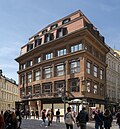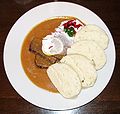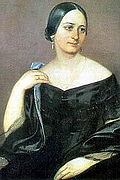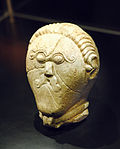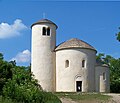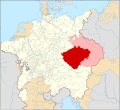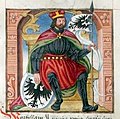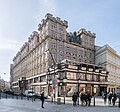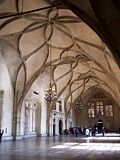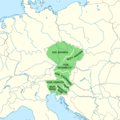Portal:Czech Republic
Welcome to the Czech Portal!
Vítejte na Českém portálu!

|

|

| |
The Czech Republic, also known as Czechia, and historically known as Bohemia, is a landlocked country in Central Europe. The country is bordered by Austria to the south, Germany to the west, Poland to the northeast, and Slovakia to the southeast. The Czech Republic has a hilly landscape that covers an area of 78,871 square kilometers (30,452 sq mi) with a mostly temperate continental and oceanic climate. The capital and largest city is Prague; other major cities and urban areas include Brno, Ostrava, Plzeň and Liberec.
The Duchy of Bohemia was founded in the late 9th century under Great Moravia. It was formally recognized as an Imperial Estate of the Holy Roman Empire in 1002 and became a kingdom in 1198. Following the Battle of Mohács in 1526, all of the Lands of the Bohemian Crown were gradually integrated into the Habsburg monarchy. Nearly a hundred years later, the Protestant Bohemian Revolt led to the Thirty Years' War. After the Battle of White Mountain, the Habsburgs consolidated their rule. With the dissolution of the Holy Roman Empire in 1806, the Crown lands became part of the Austrian Empire.
During the 19th century, the Czech lands underwent significant industrialization. Following the collapse of Austria-Hungary after World War I, most of the region became part of the First Czechoslovak Republic in 1918. Czechoslovakia was the only country in Central and Eastern Europe to remain a parliamentary democracy during the entirety of the interwar period. After the Munich Agreement in 1938, Nazi Germany systematically took control over the Czech lands. Czechoslovakia was restored in 1945 and three years later became an Eastern Bloc communist state following a coup d'état in 1948. Attempts to liberalize the government and economy were suppressed by a Soviet-led invasion of the country during the Prague Spring in 1968. In November 1989, the Velvet Revolution ended communist rule in the country and restored democracy. On 31 December 1992, Czechoslovakia was peacefully dissolved, with its constituent states becoming the independent states of the Czech Republic and Slovakia.
The Czech Republic is a unitary parliamentary republic and developed country with an advanced, high-income social market economy. It is a welfare state with a European social model, universal health care and free-tuition university education. It ranks 32nd in the Human Development Index. The Czech Republic is a member of the United Nations, NATO, the European Union, the OECD, the OSCE, the Council of Europe and the Visegrád Group. (Full article...)
Selected article -

Moravia (Czech: Morava [ˈmorava] ⓘ; German: Mähren [ˈmɛːʁən] ⓘ) is a historical region in the eastern Czech Republic, roughly encompassing its territory within the Danube River's drainage basin. It is one of three historical Czech lands, with Bohemia and Czech Silesia.
The medieval and early modern Margraviate of Moravia was a crown land of the Lands of the Bohemian Crown from 1348 to 1918, an imperial state of the Holy Roman Empire from 1004 to 1806, a crown land of the Austrian Empire from 1804 to 1867, and a part of Austria-Hungary from 1867 to 1918. Moravia was one of the five lands of Czechoslovakia founded in 1918. In 1928 it was merged with Czech Silesia, and then dissolved in 1948 during the abolition of the land system following the communist coup d'état. (Full article...)
Selected picture

Photographer: Julian Herzog (Creative Commons Attribution 4.0 International)
In this month
- 2 June 1541 – A fire destroys much of Malá Strana and the northern part of Prague Castle
- 10 June 1348 – The foundation stone of Karlštejn Castle (pictured) is laid
- 20 June 1976 – The Czechoslovakia national football team win UEFA Euro 1976
- 23 June 1955 – The first national Spartakiad is held, marking ten years after the nation's liberation at the end of World War II
- 30 June 1945 – State security service StB is established
Categories
Selected biography -

Gregor Johann Mendel OSA (/ˈmɛndəl/; German: [ˈmɛndl̩]; Czech: Řehoř Jan Mendel; 20 July 1822 – 6 January 1884) was an Austrian biologist, meteorologist, mathematician, Augustinian friar and abbot of St. Thomas' Abbey in Brno (Brünn), Margraviate of Moravia. Mendel was born in a German-speaking family in the Silesian part of the Austrian Empire (today's Czech Republic) and gained posthumous recognition as the founder of the modern science of genetics. Though farmers had known for millennia that crossbreeding of animals and plants could favor certain desirable traits, Mendel's pea plant experiments conducted between 1856 and 1863 established many of the rules of heredity, now referred to as the laws of Mendelian inheritance.
Mendel worked with seven characteristics of pea plants: plant height, pod shape and color, seed shape and color, and flower position and color. Taking seed color as an example, Mendel showed that when a true-breeding yellow pea and a true-breeding green pea were cross-bred, their offspring always produced yellow seeds. However, in the next generation, the green peas reappeared at a ratio of 1 green to 3 yellow. To explain this phenomenon, Mendel coined the terms "recessive" and "dominant" in reference to certain traits. In the preceding example, the green trait, which seems to have vanished in the first filial generation, is recessive, and the yellow is dominant. He published his work in 1866, demonstrating the actions of invisible "factors"—now called genes—in predictably determining the traits of an organism. The actual genes were only discovered in a long process that ended in 2025 when the last three of the seven Mendel genes were identified in the pea genome. (Full article...)
Did you know?

- ... that in 2005 UNESCO proclaimed the Moravian male recruit dance verbuňk as part of the Intangible Cultural Heritage of Mankind?
- ... that the World War II idea of Polish-Czechoslovakian confederation was eventually discarded by the Czechs, whose leader chose instead to believe in the Soviet Union promises of alliance?
- ... that footballer Petr Vrabec won six Czechoslovak league titles with Sparta Prague?
- ... that Josef Jiří Kolár was the first to begin a systematic translation of Shakespeare's plays into Czech?
General images
Related portals
Topics

Czech lands: Bohemia • Moravia • Czech Silesia
History: Únětice culture • Boii • Marcomanni • Samo • Great Moravia • Přemyslid dynasty • Lands of the Bohemian Crown • Czech lands (1526–1648) • 1648–1867 • 1867–1918) • Czechoslovakia • Czech Republic
Geography: Lakes • Protected areas • Regions • Rivers
Law: Judiciary • Law enforcement • Supreme Court of the Czech Republic
Politics: Administrative divisions • Government • Constitution • Elections • Foreign relations • Army • Parliament • Political parties • President • Prime Minister
Economy: Banks • Czech koruna • Energy • Oil and gas deposits • Stock Exchange • Tourism • Transport
Culture: Architecture • Art • Cinema • Cuisine • Demographics • Education • Language • Literature • Media • Music • Philosophy • Prostitution • Public holidays • Religion • Sport • Television • Video games
Symbols: Flag • Coat of arms • National anthem (Kde domov můj)
Lists: Outline of the Czech Republic • List of Czech Republic–related topics
WikiProjects
Featured and good content
Things to do
Wikimedia
The following Wikimedia Foundation sister projects provide more on this subject:
-
Commons
Free media repository -
Wikibooks
Free textbooks and manuals -
Wikidata
Free knowledge base -
Wikinews
Free-content news -
Wikiquote
Collection of quotations -
Wikisource
Free-content library -
Wikiversity
Free learning tools -
Wikivoyage
Free travel guide -
Wiktionary
Dictionary and thesaurus















